
In the future, Bunji Sotoyama’s visually and emotionally rewarding Soirée may be remembered as a film of important firsts. The first release of the freshly minted production company Shinsekai, it also marks the cultural moment when we all discovered Haruka Imou.
But for now, still on the cusp of stardom, it was not Ms. Imou’s presence that brought a huge contingent of still photographers and nine TV cameras to the Q&A session following our screening — it was the film’s producers, Kosuke Toyohara and Kyoko Koizumi, two of Japan’s most popular and prolific actors.
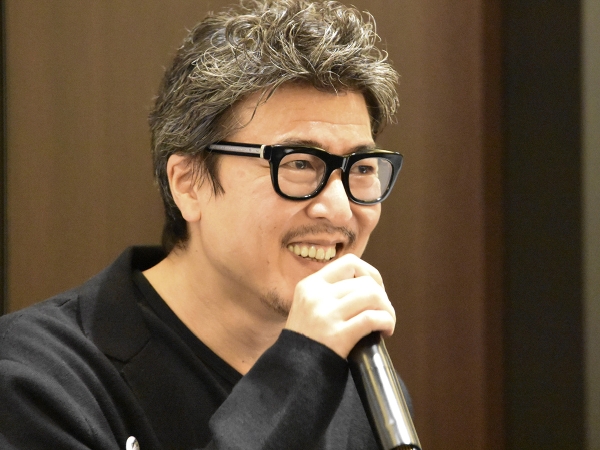
Citing the careers of John Cassavetes, Clint Eastwood, Jodie Foster and Juzo Itami,
producer KosukeToyohara reassured journalists that he would continue to act,
as well as produce and direct. ©FCCJ
Gamely agreeing to comment briefly about the genesis of the project — but humbly standing off to the side of the stage as he did so — Toyohara recalled, “Two years ago, we met with Mr. Sotoyama about making a film together in Wakayama, and [decided to] establish a company together, Shinsekai (‘new world’). We wanted to protect the uniqueness [of his script] and the freedom of the filmmaking. This wasn’t only because it was our first project as a production company, but because we felt these are values that should be highly prized in filmmaking, and in culture in general. We also wanted to protect Mr. Sotoyama’s artistry without diluting the [weightiness] of the project.”
The audience immediately understood that Toyohara was referring to the film’s backdrop of power and sexual abuse, issues that have begun popping up more frequently in Japanese narrative films, but have rarely been handled with the same level of empathy and discernment that they are in Soirée.
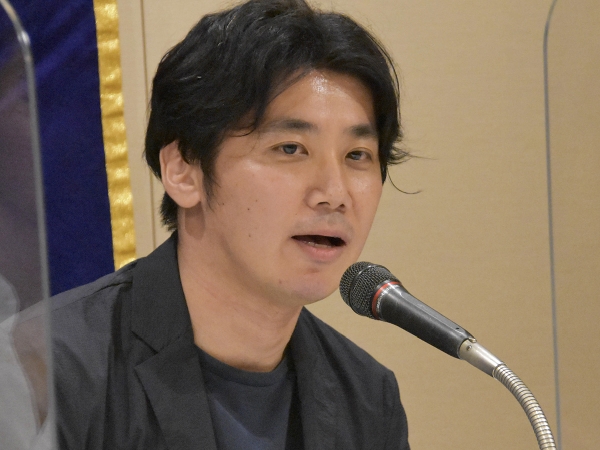
©Koichi Mori
Sotoyama, who reportedly spent some 10 months working on the script with the producers, recalled, “They encouraged me to question exactly what I wanted to say with my work, and finally, we were able to arrive on the same page. One message I wanted to make clear is that we are not born to be hurt. That leads to the theme of Japan’s unforgiving, non-inclusive society, which is forcing people to suffocate. Unfortunately, I don’t have any answers, but I think what I can do as a filmmaker is to continue making films about this.”
The two young protagonists of Soirée do indeed seem to be slowly suffocating. Sharing attributes with many of today’s disaffected youth, they are immeasurably lonely, alienated, unable to overcome their crippling self-doubt. Shota (Nijiro Murakami, Still the Water, Destruction Babies, The Gun) has come to Tokyo to pursue his dreams of being an actor, but when we first meet him, he is instead skimming an innocent victim in an “ore-ore” fiscal scam. He may be a skillful conman, but in his acting class, he’s also the target of a cruel verbal outburst from the director.
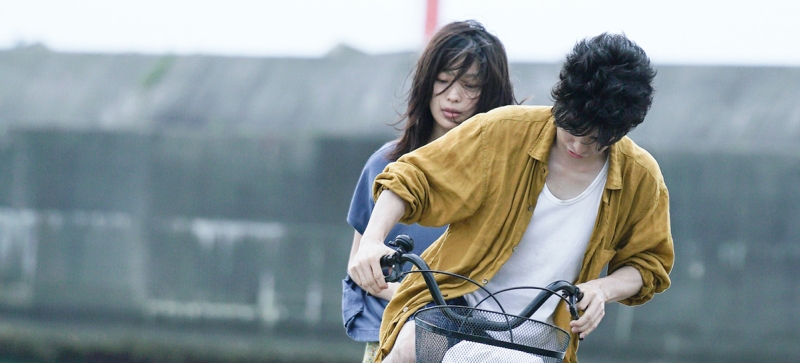
©2020 SOIRÉE Film Partners
When Shota’s drama group journeys to a remote seaside town in Wakayama, where they will hold workshops with the inhabitants of a senior citizens’ home, we learn that Shota is from the area himself, but that he has essentially severed ties with his family. At the Sakura Garden senior facility, he meets the forlorn Takara (Haruka Imou, immediately magnetic in her first leading role).
Shota is tasked with bringing her along to the local summer festival, and as he arrives to pick her up, so too does the man most responsible for crushing her spirit. After a violent scuffle, Shota grabs Takara by the hand and they run. Their escape is misconstrued, and their unplanned journey takes on a more urgent tone. But as it continues, the pair are put to the test physically, emotionally, financially. “God puts us through trials, but always gives us a way out,” Shota reassures Takura. As they search for that way, they encounter and are helped by caring souls; but until they’ve faced up to their own pasts, the journey cannot end well.
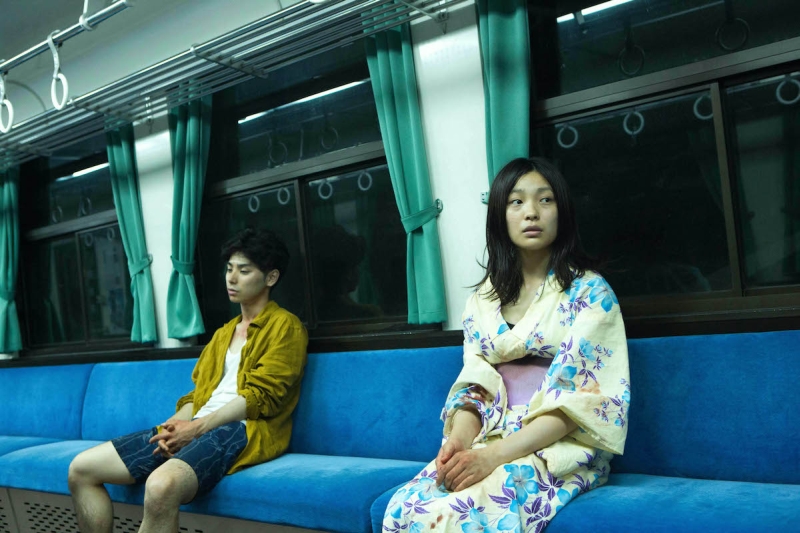
©2020 SOIRÉE Film Partners
Beautifully lensed, with performances of rare delicacy and naturalness, Soirée marks a real departure for the director, who has previously demonstrated an unusual commitment to depicting the older generation. His award-winning short On This Side (2010) and his feature debut, A Sparkle of Life (2013), focused only on characters of a certain age. Even the short that brought Murakami and Sotoyama together for the first time in 2017, Harunareya, costarred the veteran Kazuko Yoshiyuki and foregrounded dementia.
“I’ve been depicting the elderly in my films for the past 10 years,” Sotoyama explained. “The elderly taking care of the elderly, people dying isolated and lonely deaths — it’s these issues that Japanese have not faced head on, which is why I want to continue depicting them. I want to draw the audience’s attention to them, to give voice to the voiceless.

The film's distributors brought in special dividers to reduce the Covid-19 risk. ©Koichi Mori
“This isn't because of a particular experience or family situation. My intention is to depict the issues confronting society in Japan, and one of those is aging and the way the elderly are suffocating. That’s a recurring theme in my work. So those who are familiar with it might be surprised that I’m telling this story about young people and their escape from reality. But nowadays, I think it’s not only the elderly who are suffocating, it’s also young people. I thought the time was ripe to focus on the younger generation as well.”
He was inspired to write the script, Sotoyama explained, after a visit to Wakayama Prefecture, south of Nara, where he’d been given an opportunity to set a film. “When I first visited, I discovered that the legend of Anchin and Kiyohime, which you see the characters enact in the film, is part of the town’s history and has been told [for generations]. I wanted to figure out a way to tell a contemporary story that connects to that.” (The legend is the subject of the acting troupe’s training with the seniors, and is also incorporated into one of the film’s most enchanting scenes of magic realism.)
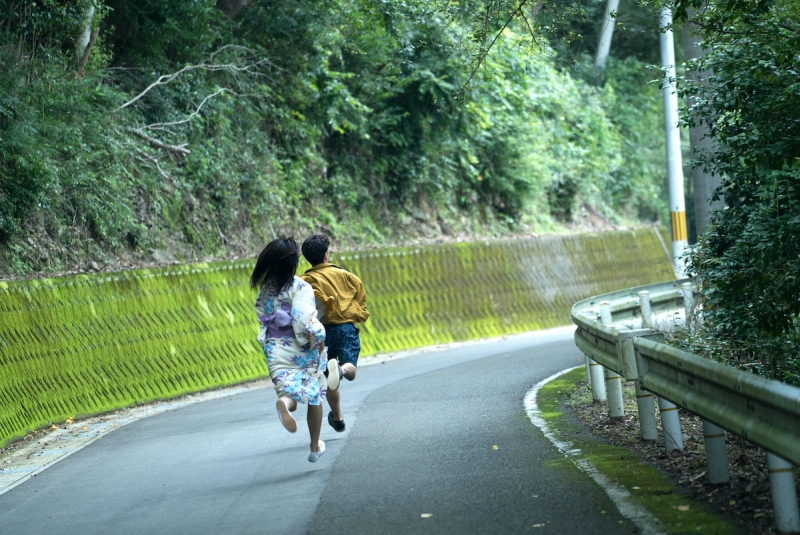
©2020 SOIRÉE Film Partners
Lauded for his casting decisions, the director was asked how he had made the selection. “We auditioned over 100 actors for Takara,” he responded, “and what ultimately convinced us to go with Ms. Imou was that she exhibited the fragility and ephemeralness of the character, as well as a strong life force. She had the right balance.
“It’s a story about a girl who’s gone through a very rough childhood and as the narrative progresses over the course of the film, we see her regain her life force, little by little. That’s what we wanted to bring to the screen, and that’s why we needed her.
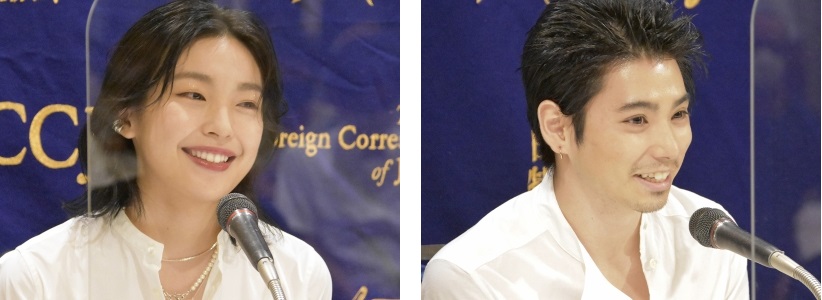
Imou and Murakami. ©FCCJ
“I first worked with Mr. Murakami on the short film Harunareya,” he continued. “He was still a teen at the time, and I found him to be a very interesting artist. Emotionally, he has this universality to him, but he also has a really contemporary aura, and I felt he could embody the dilemmas of contemporary youth.”
Commending them on their “sensitive, multifaceted portrayals” of characters dealing with abuse, a film historian asked the actors how they had prepared for the roles. Said Murakami, “Allow me to answer first, although in terms of the situation that both characters are facing, Ms. Imou’s character is the more cornered of the two. She has much more serious issues to deal with.
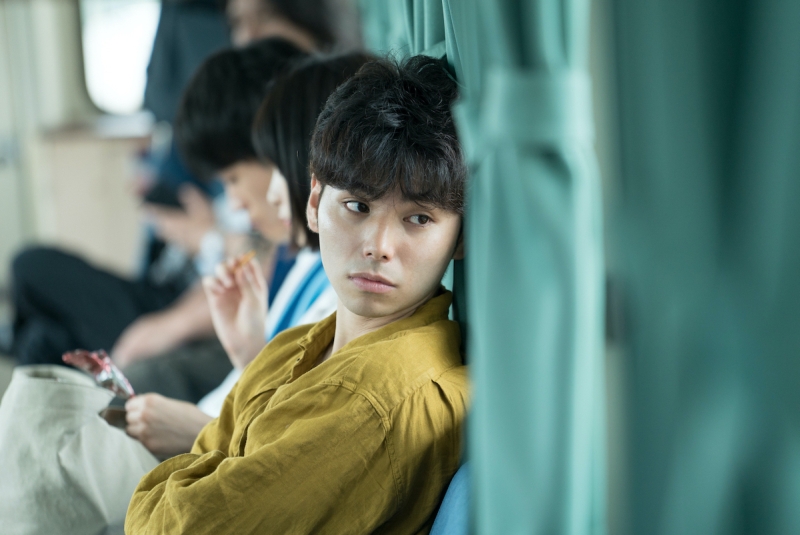
©2020 SOIRÉE Film Partners
“I think my character is more universal, in a way. He’s a simple, straightforward young guy who’s grappling with issues like How far can I go with my [limited] talent? What am I going to do? How am I going to achieve my dreams? He’s come all the way from Wakayama to Tokyo to become a star, but he’s almost on the brink of giving up. Yet through this relationship with Takara he’s given the chance to be, or to act as, a hero.
“It’s about the conflicts that Shota goes through and the walls he has to [tear down],” he elaborated. “There are several important themes: first of all, you have to work hard and study hard. And then, you have to learn how to discern between people who are just hard on you and those who are hard on you but love you. Is it coming from a place of love? Those are some of the things the role made me think about.”
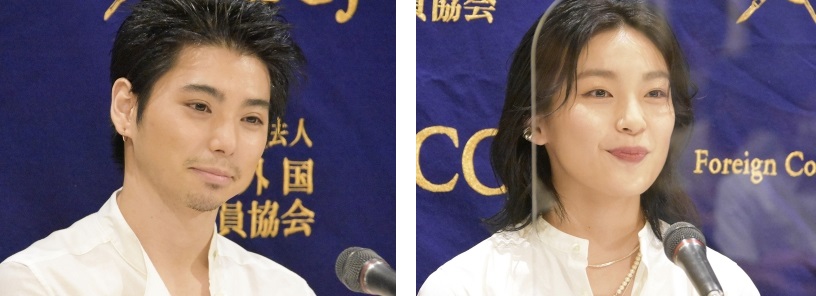
©FCCJ
Said Imou, “It was challenging to prepare for my role because I hadn’t gone through such an experience, yet I needed to confront it head on [in order to portray it with the right sensitivity.] It wasn’t enough to just presume what Takara must’ve gone through psychologically, I really had to live the character, to walk in her path.
“They say that you can’t choose your parents, but it’s a fact that you can choose your own path. You can stand on your own two feet. You can stand up and put yourself back together, no matter how many times you topple over. That’s what I wanted to depict through this character. And through her, I was able to experience how strong and utterly cool a woman can be."
Demonstrating a media savvy that will stand her in good stead as her career takes off, Imou also noted, “I was able to work on this project with wonderful producers who are extremely active as actors themselves. They kindly gave me a platform where I could release my creativity and express myself, and it’s been a really rewarding experience. I’m also grateful that I had this opportunity to create a singular role together with the director, my castmates and the crew. I’m a film lover myself, and I hope to continue working as an actress for the rest of my life. I also hope Soirée gives people a bit of optimism about this unforgiving, non-inclusive society.”
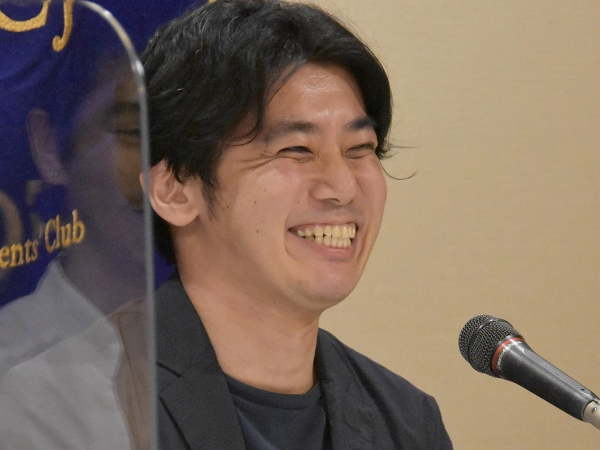
©Koichi Mori
The director, too, is ready for his closeup. Taking a question about the film’s French title, he made it really matter: “In Japan, ‘soirée’ equates to the evening presentation of a stage production,” he explained. “However, the film’s also about the hours between dusk and dawn, and ‘soirée’ speaks to the themes we’re trying to depict. It also alludes to the fact that we are our own life’s [leading] character. And in this era of Covid-19, I think it can also be seen in terms of how all of us are waiting for the dawn to break, for the light at the end of the tunnel.”
An exciting international premiere will be announced very soon, kicking off what is sure to be an abundance of overseas festival appearances.
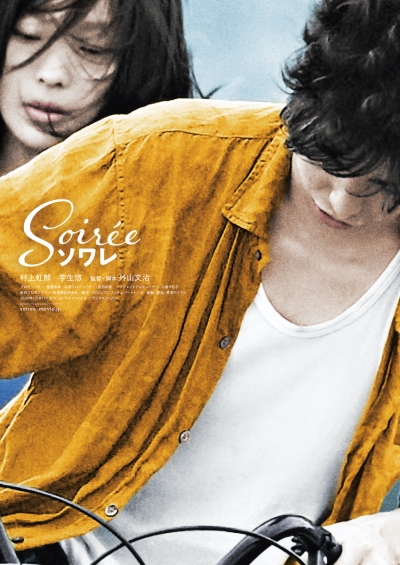
©2020 SOIRÉE Film Partners
Posted by Karen Severns, Saturday, August 22, 2020
Selected Media Exposure
- 外山文治監督、村上虹郎は「今の若者の葛藤を背負っていただくには一番適した俳優」
- 外山文治監督、村上虹郎は「今の若者の葛藤を背負っていただくには一番適した俳優」―『ソワレ』記者会見
- 「ソワレ」監督が村上虹郎の魅力語る、「若者の葛藤を背負うには一番適した俳優」
- 村上虹郎・芋生悠ら登壇『ソワレ』外国特派員協会記者会見
- 村上虹郎×芋生悠「ソワレ」 “時代から取りこぼされた人々”を見つめる外山文治監督が描く日本社会の不寛容
- 芋生悠、村上虹郎とのダブル主演映画「ソワレ」を世界にアピール「希望を与えられたら」
- 芋生悠「一生役者を」豊原功補と小泉今日子に感謝
- 村上虹郎×芋生悠W主演『ソワレ』8/19記者会見にて豊原功補、映画プロデュースに挑んだ想いを告白
- 豊原功補「色眼鏡は意識せず」俳優業との両立語る
- 豊原功補、俳優と演出業の両立に意気込み「存分にやっていきます」
- キョンキョンこそ世界基準 米メディア「政治的発言どんどん言って」
Read more
Published in: August
Tag: Bunji Sotoyama, Nijiro Murakami, Haruka Imou, Kosuke Toyohara, sexual abuse, power harassment, Shinsekai
Comments

